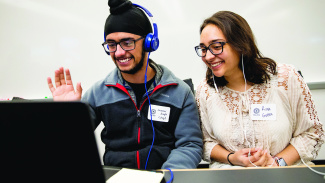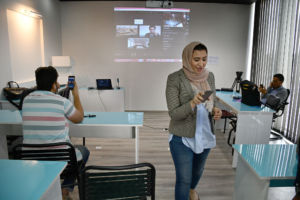Michigan Ross To Offer New Virtual Exchange Course For Undergraduates

Cross-cultural relationships in business can be challenging, but students adept at navigating them are far more likely to excel in business — not to mention a host of other global professions and fields.
A unique course offered at the Ross School of Business, and facilitated by William Davidson Institute, will equip students with the skills they need to work on cross-cultural, geographically dispersed teams so common in today’s business world. Open to all majors, the course uses technology to connect University of Michigan students with their peers in Egypt, Lebanon and Libya.
Business & Culture: A Virtual Practicum (BA 310), a new 14-week, three-credit course, will serve up a mix of traditional classroom sessions and hands-on, experiential activities. The innovative course will be offered in the winter 2020 semester and most students may register through Wolverine Access now.
The course will increase students’ awareness of the scope and nature of cross-cultural business and allow them to apply their new knowledge through work in international teams. It will be led by Michigan Ross Clinical Assistant Professor and WDI Faculty Affiliate John Branch, along with professors from American University in Cairo and American University in Beirut and the founder of the Benghazi Youth for Technology and Entrepreneurship in Libya.
“Success in business, and increasingly also in life in general, requires cultural competence—the ability to navigate culturally awkward situations, respect for alternative worldviews and the skills to lead people who are different,” Branch said. “Arguably, when it comes to developing cultural competence, nothing can replace a cross-cultural experience living, studying, or working abroad.”
But Branch said today’s interconnected world allows a simulation of a cross-cultural experience.
“Using the internet and other technologies, it enables students from four countries to work and study together,” he said. “They will ‘attend’ course sessions together, studying cases which reveal unique cultural approaches to business.”
Students will maintain a journal filled with their cultural reflections and also participate in an online discussion forum with their international peers where ideas, opinions and questions are shared. For the final project, students will form international teams and research and plan the internationalization of a fictitious company.

The course is expected to run four times beginning winter 2020. It builds off WDI’s successful project from 2017 and 2018, the MENA-Michigan Initiative for Global Action Through Entrepreneurship (M²GATE) program. That project brought together more than 400 students from five Michigan university campuses, including U-M, and their peers in Egypt, Libya, Morocco and Tunisia. M²GATE and the Business & Culture course are both made possible with grant support by the Stevens Initiative, which is sponsored by the U.S. Department of State, with funding provided by the U.S. Government, and is administered by the Aspen Institute. The Stevens Initiative is also supported by the Bezos Family Foundation and the governments of Morocco and the United Arab Emirates.
In addition, WDI’s Performance Measurement and Improvement (PMI) will evaluate the impact the program has on students in the U.S., Libya, Lebanon and Egypt in areas such as empathy and cross-cultural skills, and use the findings to look for ways to improve subsequent BA310 classes. The data from the PMI team’s work also will be used to optimize future virtual exchange courses.
“Virtual exchange is an ideal way to prepare students for the global workforce they’ll soon be part of,” said Amy Gillett, academic advisor of the new program and vice president of WDI’s Education sector. “It’s also a fun and exciting way to learn and a great way to build an international network.”







